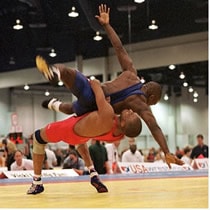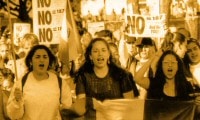آن سالیوان و هلن کلر

Anne Sullivan and Helen Keller
The story of Anne Sullivan and Helen Keller is the story of a dedicated teacher and an eager student. This story is very remarkable and inspiring because the teaching was done without sight and without sound.
Helen Keller was born in the American state of Alabama in 1880. She was a happy and healthy baby, but before she reached the age of two, she was struck by a severe fever. As a result of this fever, she became both deaf and blind.
After her illness, the young Helen Keller learned to use her other senses. For example, she touched other people’s hands to figure out what they were doing. In this way, she also learned that people could communicate by moving their lips. Helen could not talk; instead, she communicated with her family by making sign movements with her hands and body. However, Helen became very frustrated by her inability to see, hear, and talk. She often became very angry and had many “temper tantrums.”
When Helen Keller was six years old, her family took her to see Dr. Alexander Graham Bell, who was an expert on educating deaf children. (This man was also famous for inventing the telephone.) As a result of this visit, Helen’s parents hired a tutor for their daughter. The tutor was a very intelligent deaf woman named Anne Sullivan.
At first, it was difficult to teach Helen because she still made many angry outbursts. Gradually, Anne Sullivan gained Helen’s trust. One day, Anne began to teach Helen to communicate. Anne took Helen to a well and pumped some water onto Helen’s hand. Then, Anne used her finger to write the letters w-a-t-e-r onto Helen’s hand. By repeating this, Anne was able to teach Helen how to write the word “water.”
As soon as Helen learned that things could be named in this way, she wanted to learn the names of many other objects and actions. She was curious about many things, and learned a great number of words. She also learned to read by using the Braille alphabet. This alphabet allows the reader to feel letters and words, which are represented by bumps on a page. Also, Helen learned to talk, by feeling and then copying the movements of people’s mouths.
When Helen Keller was 16 years old, Anne Sullivan went with her to college. Anne acted as Helen’s interpreter, and Helen was very successful in her studies. After her graduation, Helen dedicated her life to improving conditions for the blind, the deaf, and the poor. Anne Sullivan died in 1936 and was remembered as the “Miracle Worker” for her triumph in educating Helen Keller.
After Anne’s death, Helen continued to give lectures in countries around the world, and was active in many political causes. She met with presidents and prime ministers, and helped to improve conditions for people who were deaf or blind. At the time of her death, in 1968, Helen Keller was one of the most admired people in the world.
inspiring:

giving people a feeling of excitement and a desire to do something great
ᅳopposite uninspiring
inspiring music
King was a great orator and an inspiring leader.
struck:

the past tense of strike
frustrated:

to cause (someone) to have feelings of annoyed disappointment or dissatisfaction:
After a frustrating two hours delay, our train at last arrived.
I’m feeling frustrated in my present job; I need a change.
Another Source:
feeling annoyed, upset, and impatient, because you cannot control or change a situation, or achieve something
He gets frustrated when people don’t understand what he’s trying to say.
frustrated with/at
She had become increasingly frustrated with her life.
tantrum

a sudden short period when someone, especially a child, behaves very angrily and unreasonably
have/throw a tantrum
She throws a tantrum when she can’t have the toy she wants.
children’s temper tantrums
outburst:
something you say suddenly that expresses a strong emotion, especially anger
He later apologized for his outburst.
emotional/violent/angry outburst
his father’s violent outbursts of temper
outburst of
an outburst of anger

Another Source:
a:
sudden powerful expression of a activity:
outbursts of gunfire
b:
feeling:
outbursts of laughter/weeping
well:

a place where water can be taken from underground:
The old well in the village had a wall around it and a bucket that could be lowered for water.
to sink a well (=dig a hole to obtain water) in order to irrigate the desert
well water
bump

a small raised area on a surface
The car hit a bump on the road.
ᅳsee also speed bump
interpreter:
someone who changes spoken words from one language into another, especially as their job
ᅳsee also translator
Speaking through an interpreter (=using an interpreter) , Ahmed said, ‘I’m very worried about my wife and children’.
dedicate:

to give all your attention and effort to one particular thing
dedicate yourself/your life to something
The actress now dedicates herself to children’s charity work.
the :
used before an adjective to make it into a plural noun when you are referring to all the people that the adjective describes
She devoted her life to helping the poor.
a school for the deaf
wars between the English and the French
triumph:

a complete victory or success:
His new movie is an absolute triumph.
The story of her triumph over cancer is very moving.
They held a party to celebrate their election triumph.
cause:

an organization, belief, or aim that a group of people support or fight for
cause of
her lifelong devotion to the cause of women’s rights
Nationalist/Republican etc cause
champion/further a cause Since founding Island Records, Blackwell has championed the cause of Jamaican music.
worthy/good cause (=an organization that helps people who are ill, old etc, especially a charity)
You can get fit, and at the same time raise money for a worthy cause
.Please give generously, it’s all in a good cause (=done in order to help people) .
فهرست درس های سطح 3
این متن در تاریخ 2 بهمن 1398 توسط مشاور سلام زبان ویرایش شد.